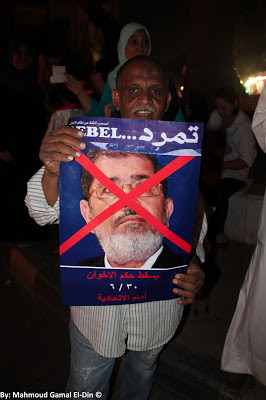الليلة الكبيرة
Knowing that some of the my generation have no idea what "El Laila El Kebeera" is was a great shock for me. Especially because I regard it as a very important part of our culture, not just because it's a lovely puppet play, but also because it records a lot of our rituals. These rituals define Egypt, they're only here and are not done in that way in any other country, they're our unique culture. So for me it's a great treasure that everyone should grow up to know, especially since most of us have never even seen a real مولد. Mooleds in themselves have a very special taste here, we're one of the very few Sunnis who celebrate Mooleds, a custom that is more of Shiites than of Sunnis and one that we've become accustomed to since the Fatemi Dynasty which was Shiite. And since I brought this up, during the Fatemi Dynasty (named after Fatema El Zahraa), the Azhar Mosque was built (also named after Fatema El Zahraa). Also note that before this Salafi invasion, we always called a mosque جامع the place that brings together people, also the place where you can learn many different things, all put together in one place. This name was first given to Al Azhar Mosque, and stayed in our culture since then. Hopefully it will never fade like many other things have started fading, especially that it's way better than مسجد which signifies only praying and lessens of the importance of the mosque. But back to El Leila El Kebeera, here's the nice puppet operetta which is written by Salah Jahin, composed by Sayed Mekkawi, and the puppet's design is also done by Salah Jahin. One thing remains unsaid, El Laila El Kebeera, is the last day of the Mooled. They usually celebrate for many days before the big night of the actual birthday, but the biggest celebration is done on that night.
If you don't know what that is, please watch it. If you do, then please don't forget to show it to your kids whenever you have any =).


ﻗﺒﺔ ﺳﻴﺪﻧﺎ ﺍﻟﻮﻟﻲ ﺩﻭﻝ ﻧﻮﺭﻭﻫﺎ. ﻣﺤﻼ ﺍﻟﺒﻴﺎﺭﻕ ﻭﺍﻟﻨﺎﺱ ﺑﻴﺰﻭﺭﻭﻫﺎ. ﻗﺒﺔ ﺳﻴﺪﻧﺎ ﺍﻟﻮﻟﻲ ﻓﻲ ﺍﻟﺠﻮ ﻋﺎﻟﻴﺔ. ﻣﺤﻼ ﺍﻟﺒﻴﺎﺭﻕ ﻟﻤﺎ ﻧﻮﺭﻭها
ReplyDeleteI like this verse a lot :-)
=) I love the whole thing, it's so wonderful and cheerful. Except the part with the woman looking for her lost daughter =(
ReplyDeleteياولاد الحلال بنت تايهة طول كده رجلها الشمال فيها خلخال زي ده
زحمة ياولداه. كام عيل تاه
Mothers and daughters used to wear matching Anklets, as a sign of connection and love. Zay el best friends keda el bey2semo dallaya aw selselet mafatee7 =)
Gdeda de, fe3ln kolha helwa ma3ada el 7eta de :-)
DeleteGdeda de, fe3ln kolha helwa ma3ada el 7eta de :-)
Deleteكلها مبهجة ما عدا الحتة دي =)
Delete